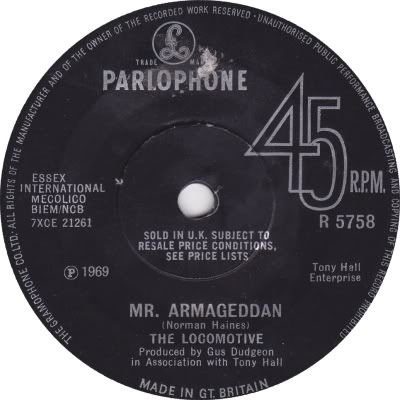
Label: Parlophone
Year of Release: 1969
Numerous music fans have a "year zero" mentality when it comes to the concept of Midlands-based ska bands - the populist view is that before Two Tone, there was virtually nothing. As with all sweeping statements, this has little grounding in fact. Birmingham had a thriving ska scene in the sixties way before Coventry's The Specials took the blueprint and brought it to wider awareness.
Locomotive are a decidedly odd case in point. They were a gigging jazz act in their earliest years, but upon being joined by the keyboard player Norman Haines were suddenly introduced to a wider array of other sounds. Having spent his time working in a record store in the multi-cultural Smethwick area, he brought an enthusiasm for Blue Beat and Ska to a band of accomplished musicians, a mind-broadening exercise which eventually led to the minor hit single (and club DJ staple) "Rudi's In Love" in 1968.
Whilst the band could probably have forged a strong career continuing in this vain, their muso tendencies were also positively tickled by the emerging progressive rock style, which led to a series of recordings which dabbled around in the musical spectrum so much that they actually sounded utterly unique. The second single "Mr Armageddan" showcases this change of style marvellously, being full of the-end-is-nigh styled hippy doom and gloom combined with blue-eyed soul vocals, a storming brass section and swirling keyboards. It's almost the sound of a band who can't quite make up their minds about their general direction producing a psychedelic single which sounded utterly unlike any other during the period. The track presented here is the original mono single version (straight from crackly vinyl) but is only an excerpt. A full version can be downloaded from iTunes and other online music stores if you're interested.
The flip "There's Got To Be A Way" (edit below) combines jazzy riffs with soulful vocals and zig-zagging musical structures. It's not going to be to everyone's tastes, and indeed there's sufficient evidence to prove that the band's multi-genre melodies turned away all the fans they'd originally built up at the time. Still, it's an intriguing record, and "Mr Armageddan" at least is up there with some of the better pre-prog, post-psych records of 1969.
Dismayed by the stone cold public response to their album "We Are Everything You See" in 1970, the band split in several directions - but perhaps most notably and appropriately, their drummer Bob Lamb went on to produce UB40's legendary debut album "Signing Off", thereby having a marked influence on the styles that emerged during the early eighties.

Label: Parlophone
Year of Release: 1969
Numerous music fans have a "year zero" mentality when it comes to the concept of Midlands-based ska bands - the populist view is that before Two Tone, there was virtually nothing. As with all sweeping statements, this has little grounding in fact. Birmingham had a thriving ska scene in the sixties way before Coventry's The Specials took the blueprint and brought it to wider awareness.
Locomotive are a decidedly odd case in point. They were a gigging jazz act in their earliest years, but upon being joined by the keyboard player Norman Haines were suddenly introduced to a wider array of other sounds. Having spent his time working in a record store in the multi-cultural Smethwick area, he brought an enthusiasm for Blue Beat and Ska to a band of accomplished musicians, a mind-broadening exercise which eventually led to the minor hit single (and club DJ staple) "Rudi's In Love" in 1968.
Whilst the band could probably have forged a strong career continuing in this vain, their muso tendencies were also positively tickled by the emerging progressive rock style, which led to a series of recordings which dabbled around in the musical spectrum so much that they actually sounded utterly unique. The second single "Mr Armageddan" showcases this change of style marvellously, being full of the-end-is-nigh styled hippy doom and gloom combined with blue-eyed soul vocals, a storming brass section and swirling keyboards. It's almost the sound of a band who can't quite make up their minds about their general direction producing a psychedelic single which sounded utterly unlike any other during the period. The track presented here is the original mono single version (straight from crackly vinyl) but is only an excerpt. A full version can be downloaded from iTunes and other online music stores if you're interested.
The flip "There's Got To Be A Way" (edit below) combines jazzy riffs with soulful vocals and zig-zagging musical structures. It's not going to be to everyone's tastes, and indeed there's sufficient evidence to prove that the band's multi-genre melodies turned away all the fans they'd originally built up at the time. Still, it's an intriguing record, and "Mr Armageddan" at least is up there with some of the better pre-prog, post-psych records of 1969.
Dismayed by the stone cold public response to their album "We Are Everything You See" in 1970, the band split in several directions - but perhaps most notably and appropriately, their drummer Bob Lamb went on to produce UB40's legendary debut album "Signing Off", thereby having a marked influence on the styles that emerged during the early eighties.